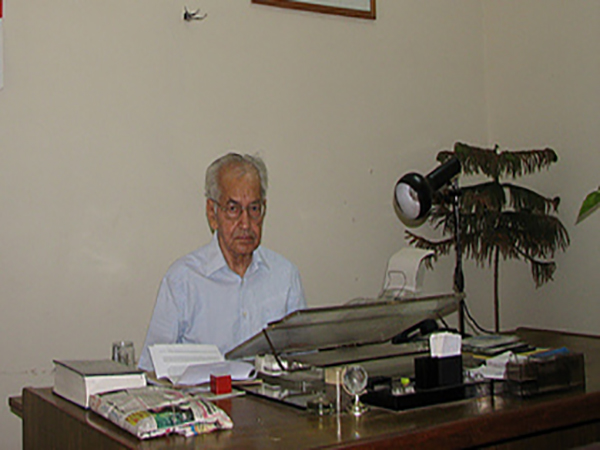Yesterday, a prominent educationist of India and great community leader Saiyid Hamid passed away. He was chancellor of Jamia Hamdard, New Delhi. The author, based in Canada, recalls his meetings with Saiyid Hamid.
Muhammad Tariq Ghazi for BeyondHeadlines
I call him Saiyid ul-Hind. He was leader, chief, sardar, buzurg, of a community and a nation which has politicians by dozens in zillozens, but no leader since the generation of freedom-fighters. He was a great man, a giant and that is why he was failed by his community and his nation. They could not rise up to the shoulders of his stature of selflessness.
He emerged to the cognition, or more correctly to perception, of his community after he was named vice chancellor of the Aligarh Muslim University in June 1980. For him, it was the beginning of a long journey on a cobbled, uneven, winding, street that we know as Muslim Indian community. For more than three decades he served, or tried to serve, his community and his nation to better than the best of his ability, despite his old age. In his frail constitution resided a restless soul.
He was at the top of such Muslims of prominence who did not have time to lament about problems since he was too busy in applying healing liniment to this or that wound, resolving this or that knotty problem, lighting this or that lamp in hearts. He was second Indian after Maulana Hifzur Rahman who had dedicated his life to take upon himself the suffer all the pain that the community had been enduring in order to free the fellow human beings of the hurt, agony, grief, anguish, anxiety. Both men knew that it was some sort of first-aid to the injured body, not the cure, but also knew that there was nobody else even to provide that first-aid to a community that had little regard for itself.
I met Saiyid Hamid Saheb first time when he visited Jeddah to introduce a gigantic plan to launch a “Muslim” English daily. That was another similarity he had with Maulana Hifzur Rahman, both in perfect vision and abject failure. Maulana Hifzur Rahman could launch the Message weekly which was never taken as a case study of failure by Muslim community. Saiyid Hamid Saheb ended up with The Nation and the World fortnightly, another case of failure that – sentimental expression of opinions apart – was also not looked into for necessary lessons. That is another long and painful story which may not be of interest to the community at large.
However, what is important is that one failure after another failure did not deter Saiyid Hamid Saheb from continuing to find one after another cause to be addressed with full dedication.
He had a charisma which would draw intellectuals around him, many of whom he would turn into social activists, but he was not a man of masses, or the masses, overfed on raw emotionalism, were too neglectful of his true potential, thus depriving themselves of a man’s promise who could guide them in the right direction. When The Nation and The World failed to produce the desired results, Saiyid Hamid focused his attention to education of the community, launching several caravans of meaningful men and women to every nook and corner of the country to emphasise the need for self-awareness. It was a journey to the future through the unnamed street of history. People are still working on that dream, although the guide is more there to oversee their work.
Only three months ago, on 30 September 2014 to be precise, an Aligarh alumni outfit conferred on him what they called lifetime achievement award named after Ross Masood. Honoring our benefactors is a commendable act, even when a nonagenarian person like Saiyid Hamid had outgrown the desire and the need for such recognition of the selfless service. Still, it was a good gesture on the part of the community. Nonetheless, it was too late, of too little use, valuable though.
I do not know if history will judge Saiyid Hamid’s service to India and to the Indian Muslims. I also do not know if history will judge the community and the country on account of Saiyid Hamid.
But I often think that some forces are writing out present. The Muslim community of South Asia and all the countries of the region, appear to being judged by history although we do not feel it or read the verdict written in the language of moral degeneration, social drift, economic disorder and political chaos. If we are able to read this language, we may still benefit from men like Saiyid Hamid. Such men do not die. They pass away, leaving their legacies to resuscitate a society whose heart has stopped throbbing.






















